Electrification, autonomy, digitalisation; the list goes on. But amid the swirl of change, it’s easy to overlook a more fundamental truth: boil down the impact of so much disruption and it’s clear that the future of the car as we know it is under assault.
In the UK, our average driving distance has been in decline for years. In 2002, it was 9200 miles, last year it was down to 7400 and this year it’s easy to imagine that that figure has been halved, despite the best efforts of Autocar’s road testers to keep you informed.
No doubt it will creep up again as lockdown eases, but I doubt that it will ever recover. We’ve all discovered workarounds to business and personal commuting, many of which improve our wellbeing and finances. How many people have paid for a 10,000-mile lease this year only to spend months staring at an expensive ornament? How many of those leases will be renewed at 5000 miles? The potential spiral is obvious.
Lockdown has made us aware of what was staring us in the face: even prepandemic, the average car was used for just six hours a week, meaning it was parked for 96% of the time. Factor in studies in the US suggesting that the average person spends 20% of their income on transport, led by car use, and 32 hours per year stationary on traffic-clogged roads, and it’s impossible not to ponder whether there’s a better way.
We’ve been here before, of course, but now there’s no question that big business and eagle-eyed investors are doing all they can to provide a catalyst to break the mould, their plans to seize a slice of the pie and their audience with the country’s decision-makers justified by the potential environmental gains. Car sharing, ride hailing and eventually even hired, autonomous pods so in demand that they never need to sit idle are all on the agenda. Already trials are proving effective in some big cities.
Yet it’s also a fact that the number of new cars registered in the UK has risen as the number of miles driven has fallen. The pandemic has made us more aware than ever of our love of personal space, in turn driving a surge in used car sales. Public transport – trains, buses and more– has been around forever, but most prefer not to use it.
So too there are examples of car-sharing schemes, run by the likes of BMW and Daimler, that were ended early. At one memorable dinner with a BMW executive, when asked what he had learned from a multimillion-pound car-sharing scheme in the US, he replied off the cuff: “That people don’t want to share cars.”
Change is certain. The outcome of it is less so.
READ MORE
Analysis: will car sharing replace vehicle ownership?





Join the debate
Add your comment
Imagine autonomous car sharing schemes came first, you were used to a car arriving when you needed it, for the size you wanted and didn't need a driveway. Now imagine someone invented a car you had to buy, drive yourself, that spent 90% of it's time on the driveway and was just one model when you were used to having small cars, large cars, people carriers etc as required. Would you still want to own the car?
Imagine your scheme being taken up, you get the you needed etc etc, will it arrive clean inside and out?, if it breaks down?, who is responsible?, how long before your supplied with a replacement?, these are only a few questions I could think of.
Peter by all means you keep your car. I'm going for the autonomous option, a nice glass of red with friends and a classic motorbike for my fun
Averages are meaningless especially when it comes to driven mileages and car use. The bandwidth of car use in the UK (and other countries) simply cannot be met with EV's or the solutions this feature refers to. Fine for the academics who live in the cloud cuckoo land of London but in the real world ( you know, north of Watford and even worse, north of Edinburgh) those options simply will not work for the majority. At the moment i hardly use my car however when back in the office my daily commute is 80 mile round trip with no public transport option. My holidays involve towing a caravan upto 2000+ mile round trips and weekends away throughout the year so how does this work for me and how does it reflect in averages? I am not against tech and can see many benefits (such as helping the disabled or older drivers keep driving longer) but let us also be realistic with regard to the extent and limits of its use.
Did you really need to invoke the tedious 'metropolitan elite vs real people' trope here? It doesn't reflect very well on you at all.
A majority of people live in cities. Most people never tow anything with their cars. For them, EVs could make sense. One of the things that is supposed to distinguish human beings from most other animals is our ability to empathise and understand the world from someone's perspective but this appears to have passed you by.